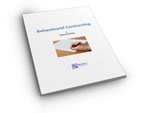 You are stuck in a traffic jam on the way to an important meeting that can directly affect your chances of clinching a major contract. You love your job and you really don’t want to lose it. Which of the following sounds more like you?
You are stuck in a traffic jam on the way to an important meeting that can directly affect your chances of clinching a major contract. You love your job and you really don’t want to lose it. Which of the following sounds more like you?
“This is awful…I’m really stupid…why didn’t I leave more time? They will think I am so unprofessional – I’ve really screwed up. Come on get a move on there’s plenty of space to get through there….”
OR
“This isn’t exactly the best thing that could have happened. However, getting upset is not going to make the traffic move any faster. It’s better for me to stay calm and arrive in a fit state for what I have to do.”
Which of the two people above do you think performed better when they got to the meeting?
The way you think has a direct relationship to how you feel and how you behave. Thinking style affects how stressed you get in any given situation. In the scenario above, most people would assume that the first person’s feelings are caused by the traffic. But, as the second person shows, it is possible to react to the same event very differently by changing the way you think about it. Negative thoughts lead to negative outcomes and, in turn, can turn a crisis into a drama.
Researchers at the Harvard School of Public Health and the Department of Veterans Affairs in Boston discovered that people who viewed the world more optimistically had half the risk of coronary heart disease than their more pessimistic counterparts. While a Study at Yale University found that thinking positively about ageing adds approximately seven and a half years to your life. Optimists also tend to have happier lives and were healthier regardless of the degree of stress they experienced. The research team at Bingham & Women’s Hospital and the Harvard Medical School believe that attitude strengthens the immune system.
Psychologists at Carleton University, Ottawa, Canada discovered that stress was often experienced when people put off undertaking a task. They isolated 5 forms of faulty thinking that contributed to this type of behaviour called procrastination including a belief that you can only work when in the mood and a need to like the task in hand.
These and many more studies have influenced the stress management field. Practitioners now include helping people develop healthy thinking styles as part of their stress management programmes.
Find out about my Transformational Coaching Programme here.






